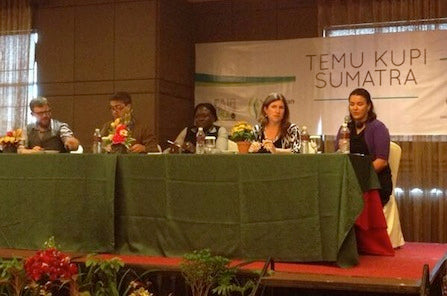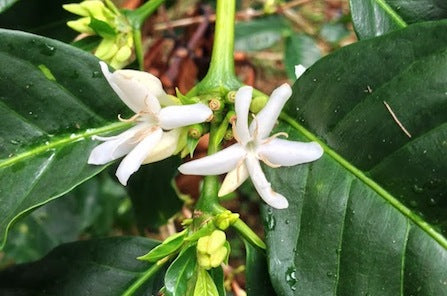
The Importance of Transparency: A Trip to Indonesia, Part 1
Visiting our parters at origin is very important to us at Salt Spring Coffee. It deepens our connections with farmers and co-ops, increases transparency in the coffee supply chain and allows us to understand and help farmers overcome the challenges that they face on a daily basis.
Mickey recently came back from a trip to Indonesia, where he was invited to attend the last day of panel discussions in Medan at Temu Kupi Sumatra 2013, a private event hosted by Green Mountain Coffee Roasters and sponsored by the Lutheran World Relief organization. The panel’s theme was “Global Perspective in the Coffee Market”, and it brought together producers, suppliers, growers and other participants in the coffee supply chain, to talk about challenges in the industry.

After the Temu Kupi Sumatra event in Medan, Mickey travelled by a Cessna Caravan plane to the coffee-producing region of Takengon.

In Takengon, he visited the Koperasi Baitul Qiradh Baburrayyan (KBQB) co-op where our newest coffee is produced, and met many of the co-op workers and managers.



In Takengon, a challenge for coffee producers is being able to dry green beans properly. With fair trade premiums, the KBQB co-op has been able to build a clear roof over the drying patio to speed up and improve the quality of the drying process.

In addition to the challenge of a damp climate, during this past July, several of the small communities around Takengon that supply green coffee to KBQB suffered a devastating earthquake. The earthquake destroyed much of the city’s infrastructure and water supply, so with the help of funding from Green Mountain Coffee Roasters, public water tanks, showers and wash areas were installed in the communities. These helped highlight the importance of maintaining strong relationships and transparency in the coffee production cycle. These public areas were immensely beneficial to the community, and they held a celebration to honour them.

In the wake of the earthquake’s destruction, a new community bathhouse was also reconstructed, with the help of the National Cooperative Business Association (NCBA).

Another rewarding aspect of the trip included being able to observe coffee cherries in different stages of growth (as a result of the long growing season and “fly crop” that happens in coffee-producing regions very close to the equator, such as Indonesia and Uganda).

Other highlights include cupping coffee at the KBQB co-op, visiting the public market at Takengon, and enjoying a slightly-sweet, avocado puree coffee treat at the Hip Cafe.



Overall, the visit to Takengon drove home the importance of fostering meaningful relationships with our partners at origin, as these kinds of relationships help to increase the standard of living in coffee-producing communities and in doing so, increase quality standards.
For more details and photos from the second half of Mickey’s Indonesia trip, read Tunas Indah Co-Op: A Visit to Indonesia, Part 2.
The post The Importance of Transparency: A Trip to Indonesia, Part 1 appeared first on Salt Spring Coffee.


